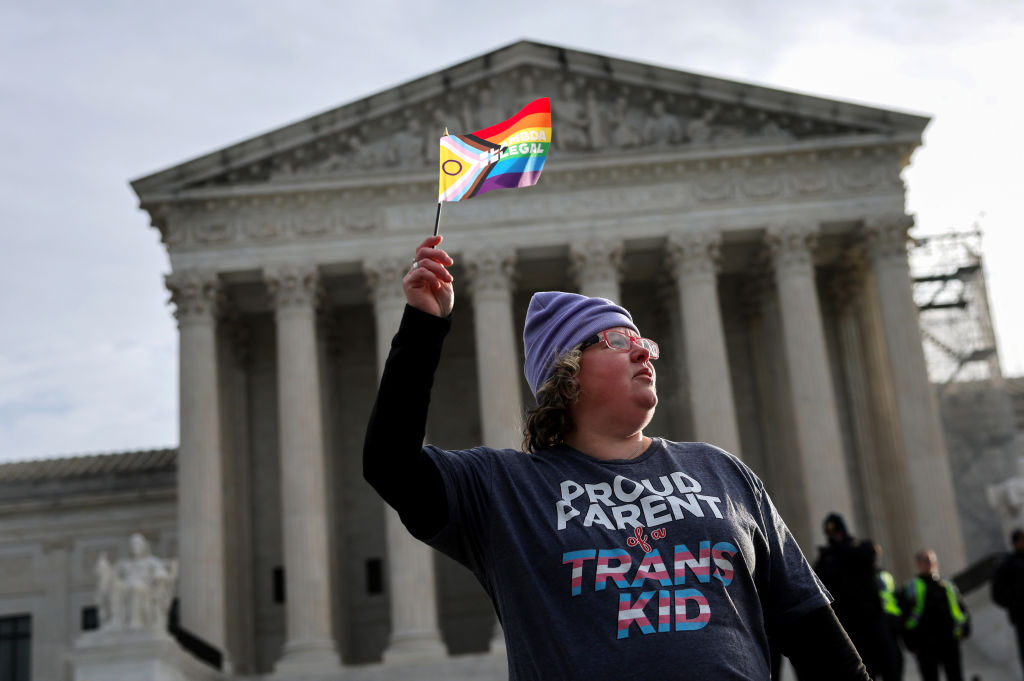US Supreme Court, Washington, DC
Today marked a monumental day at the United States Supreme Court: for the first time, a lawyer who identifies as transgender, the ACLU’s Chase Strangio, argued before the justices.
The case is US v Skrmetti, named after the Attorney General of the state of Tennessee, which banned “gender-affirming care” in 2023. Subsequently, the ACLU, Lambda Legal, and a white-shoe law firm, Akin Gump Strauss Hauer & Feld LLP, sued, arguing that the ban constituted a form of sex discrimination. Natal girls can take puberty blockers for precocious puberty, so why shouldn’t transgender girls receive them to prevent unwanted secondary sex characteristics? Natal boys can take testosterone for an endocrine disorder, so why wouldn’t trans boys get them to transition?
Tennessee’s ban was elevated to the Supreme Court, with the US Justice Department signing on as plaintiff, because it had excavated the least amount of evidence. In Strangio’s words, if they hadn’t brought this case, their opponents would have “brought a case with a set of facts more in their favour”. Lawsuits in other bans, however, had already revealed the lack of solid evidence base for gender-affirming care. The DOJ just didn’t want the justices to interface with those facts.
In a packed courtroom, the three liberal and six conservative justices had their political biases on show. Justice Ketanji Brown Jackson, who famously could not answer the question of what a woman was in her confirmation hearing, compared the case to Loving v. Virginia, which prevented marriage on the basis of race. Justice Elena Kagan couldn’t understand Tennessee’s argument, that we prescribe medication based on condition, not sex — the state’s Solicitor General Matthew Rice had contended that providing morphine for pain relief was utterly different to providing it for assisted suicide. The liberal justices weren’t having it: both boys and girls can get morphine, after all.
Justice Brett Kavanaugh worried over implications for girls’ and women’s sports. Others brought up the Cass Review, the shifts to more cautious guidelines in several European countries, and the conundrum of detransitioners. Justice Neil Gorsuch, who may end up being the swing vote, kept quiet the entire time.
Some observers told me they expected a 6-3 ruling, down ideological lines. Others thought that the sometimes libertarian-minded judges might shy away from regulating medical care to this extent. There will be no decision for many months — and when it does come, it won’t be definitive. Rather, it will affect how lower courts scrutinise the claim of sex discrimination. But it could have huge implications. If the court decides that transgender people are a protected class, it will be very hard to pass a ban on treatments for them, or any regulations which privilege biological sex over gender identity, in sports or elsewhere.
That’s unlikely, as the court hasn’t created a new protected class in many years, declining to define either the elderly or disabled people as such. But the justices could decide that the onus is on states to prove they’re not discriminating based on sex, making it harder to uphold bans.
If all that sounds anticlimactic, then consider the other historic aspect of the day. It may be the first time the American media came face to face with the many feminist, lesbian, gay, and even trans adults in favour of banning paediatric gender medicine.
In front of the courthouse, two competing rallies took place. On the left, the ACLU handed out purple hats and scarves with the phrase “the freedom to be ourselves”. On the right was a group holding a banner reading “Democrats Against Puberty Blockers.” Lesbian protestors carried signs reading “I am a childhood desister” and “Stop Transing Gay Kids.”
These people were trying to draw attention away from the Left-Right framing that the American press applies to this story, and towards the fact that the vast majority of children with early-onset gender dysphoria grow out of those feelings by the end of puberty. They were revealing the feminist objection to men identifying as women and demanding entry to women’s spaces and sports. They were showing the American public that there remains much of this story they haven’t been told.
Whether the American media takes this opportunity to reassess the long-running narrative beyond the Left-Right framing — that conservatives ban gender-affirming care because of bigotry and liberals support it because of kindness — remains to be seen. Inside the courthouse press room, I asked journalists — from Vanity Fair, NBC, and other liberal outlets — if they’d seen the rally of lesbians, gays, and feminists in support of the ban. “Oh, the anti-trans rally, yes,” they uniformly quipped. In taking this stance, they were every bit as closed off to other points of view as the justices had been.











Join the discussion
Join like minded readers that support our journalism by becoming a paid subscriber
To join the discussion in the comments, become a paid subscriber.
Join like minded readers that support our journalism, read unlimited articles and enjoy other subscriber-only benefits.
Subscribe